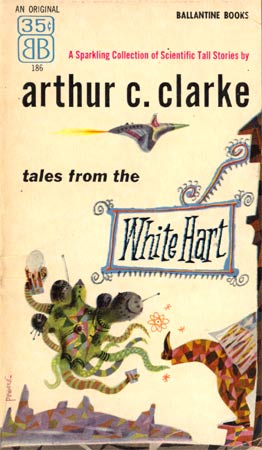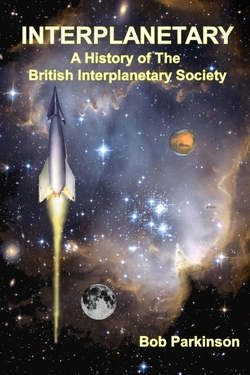I’m a great believer in getting back to work when bad news hits, and I suspect Arthur C. Clarke was as well. His almost 100 books surely attest to the fact. With intriguing exoplanet news about to be released, that is exactly what I’ve been doing this morning, with an article I’ll post tomorrow. As I’ve been developing that story, I’ve kept pondering what to say about Clarke, working up a kind of reminiscence in the back of my mind, then deciding everything was happening too fast for that.
Not that his death was a surprise, Sir Arthur having been ill for quite some time, but the thought of a world without Clarke in it takes a bit of getting used to. I’ll need some time to take its measure.

Oddly, my favorite of his books was the relatively obscure 1957 collection Tales from the White Hart. The yarns in this slim volume involve one Harry Purvis, like Clarke a polymath who deals knowledgeably on most any subject, and a man whose improbable accounts flummox the ready audience in the White Hart pub. I point not to any single story, but to the cumulative effect. For when you get to know about Clarke, you learn about the British Interplanetary Society, the space-energized group of which he became so significant a member, and you learn about lively pubs.
Image: This is the first edition of Clarke’s Tales from the White Hart, Ballantine Books 186, complete with Richard Powers cover.
Instead of the White Hart, the BIS generally met at London’s Mason’s Arms pub on Maddox Street, its gatherings the basis for the later Clarke stories. Imagine some of the most imaginative people on the planet sorting out things to come in the era before World War II. Imagine them in the postwar era, still haunting their pubs of choice, as they went about the audacious work of designing from top to bottom a starship they would call Project Daedalus, a one-way flyby probe of Barnard’s Star that would use nuclear micro-fusion to reach 12 percent of light speed.
Clarke’s signature was all over the early British Interplanetary Society, and his Tales of the White Hart reminds me how a dedicated band of thinkers — writers, scientists, engineers — can stir up change by sheer persistence and an unwillingness to accept defeat. Out of all this grew, among other things, the Journal of the British Interplanetary Society, a key venue for innovative ideas. Here I quote Geoffrey Landis: “JBIS has been the home of advanced concept thinking for a very long time now.” Yes, and you can weave a history of interstellar studies from its pages.
I pause on this note, knowing his death will trigger associations for a long time to come. Sir Arthur’s work has inescapably shaped my own concept of the future. I was pleased that in one of the obituaries I read, Clarke said that out of all his accomplishments, he would most like to be remembered as a writer. Those of us who write for a living can find satisfaction in pursuing a career Sir Arthur so honored, even while acknowledging that his was a vision no one will be able to replace.


Sad to see that the last of the “Big Three” has died. The Songs of Distant Earth was probably my favourite Arthur C Clarke novel: not one of his more high-concept novels, but had a more human story than most of his works. Still, I guess it will be the concepts he came up with that will be remembered most in the end.
Hi Folks;
At some point, by about the mid 1970s to late 1970s, I heard of the concept of the interstellar ramjet and Project Daedalus, and how nuclear fusion could power manned space craft to the nearest stars and even beyond. The days that I first read of these concepts put me on cloud nine wherein I seemed to walk around the house just taking in these concepts in a certain peaceful but joyous excitement almost as intense as if I had been the witness of a profound miracle.
Well, Arthur C Clarke’s books, writtings, and the movies based on his brilliant works had the same effect on numberless individuals yearning for a future of true meaning and utter excitement in the wake of the hurtful American experience of the Vietnam War, and the almost nightly references on National Nightly News programs about the ever looming threat of the seemingly unstopable Soviet Union and the Domino Theory of gradual world domination, the ever present risk of the unspeakable horror of all out global nuclear warfare.
Somehow, even for those who were not scientifically inclined nor interested in space travel, Arthur’s books and the movies based on his works burnt into the global psyche that everything will be alright and that our dreams to break the bonds of our cradle of Earth would somehow lead to world unity and a civilization of cooperation as we branch out into the cosmos. We as space heads at Tau Zero will best remember Sir Arthur and pay him respect by Dreaming the Dream of Centuari Dreams in hopes for a profound future of international cooperation and peace as we venture out to the stars. What Dreams May Come!
Regards;
Jim
andy,jim, i think i have probably read most if not all of clarke’s works at some time or other.he was one of the best sf authors ever and more importantly his work provoked thought,always a highly useful thing! and lol it seems something that ALOT OF PEOPLE today have forgotten about! but i have to say 2001 was my all time favorite.very profound indeed.think i have read it at least 5 times! thank you my friends george
Not to forget all his short stories, I have the whole collection. I particularly love “Visit to planet earth” (also appeared under another name), a sobering reminder in ACC’s own words, that “human civilization is only an interlude between two ice ages”.
I can’t say it’s my favorite work of his, but it’s certainly a lot of fun.
Hi All
I can’t say for sure what my ACC favourite was, as my tastes have changed over time. My first ACC novel, which I read and reread many times, was “Islands in the Sky”, but for a long time I was a “2001” fan and likewise read and reread it. Can’t say that “2010” or “2061” were on par with “2001”, but “3001” was a good conclusion, even if it was a very different “Monolith” by the end of the tale.
I still happily reread “The Sands of Mars”, “Prelude to Space”, but I haven’t touched “2001” for a long time. “Songs of Distant Earth” is definitely a favourite out of his later novels, though I did like “Hammer of God” too. “Rama” was an excellent alien contact tale, though the collaborative sequels were less inspiring.
His short stories have some absolute gems – from “Rescue Party” right up to his collaborative rewrite of “Travel by Wire” with Stephen Baxter. “The Sentinel”, without the “2001” connection, is a classic by itself, and anticipated Ron Bracewell’s sentinel probes. “The Star” is disquieting for any Believer in light of modern knowledge, and many others, but by far and away my favourite is “A Meeting with Medusa”, for many reasons. Like all good ACC it’s a story of a real person in exceptional circumstances, and a real alien contact story in more than one way.
Somewhere, Out There, we will meet with Medusa, and Arthur C. Clarke will have prepared us for that encounter.
Lest I forget, but his other novels of the 1970s deserve a mention – “The Fountains of Paradise”, which gave us the Space Elevator (more so than Sheffield’s contemporaneous effort “The Web Between Worlds”), and “Imperial Earth”, which – I think – was ACC’s “Stranger in a Strange Land” tale. I haven’t reread either book as much as they deserve, but there’s only so much time for reading… *sigh*
I really can’t add anything to what everyone said about Sir Arthur, it’s all been laid out.
Like all great human beings, his vision will out-live us all.
The last of the Golden Age giants, and perhaps the last of the romantic optimists. Oddly, I enjoyed his aphorisms and predictions more than his novels… and this still makes my throat tighten, both as a scientist and a human: “All these worlds are yours — except Europa.”
The media and the Internet is trying awfully hard to compare
the ISS robot DEXTRE to HAL 9000, but there is no comparison –
though it is nice to see NASA at least acknowledge Clarke in
some fashion:
http://www.collectspace.com/news/news-032408a.html
Arthur C. Clarke’s last SF novel, The Last Theorem:
http://www.scifi.com/sfw/books/sfw19204.html
A short film on Rendezvous with Rama by the Vancouver Film School:
http://vimeo.com/9739256
One keeps hoping that some day RWR will get the full film treatment and become perhaps the next 2001: A Space Odyssey.
The later Twilight zone series did an episode on Clarke’s famous story “The Star”:
http://www.youtube.com/watch?v=SECLzGKDTgY&feature=related